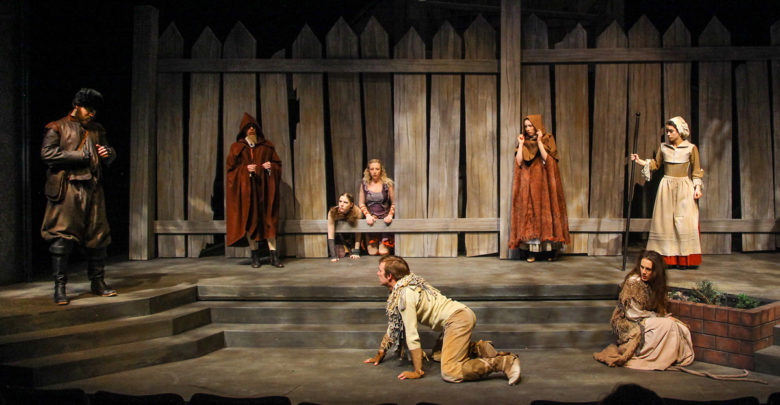Theatre Review: Studio Theatre’s “Shakespeare’s Dog”
Shakespeare’s Dog showcases the humanity exists in those who are unlike us
 Supplied
SuppliedA striking change of pace from the previous two shows in the 2019/2020 season, Studio Theatre’s rendition of Shakespeare’s Dog is an easy, entertaining watch, even if its stakes occasionally fall flat. Following Shakespeare’s rise from failing actor to Britain’s most important playwright through the eyes of his dog, Hooker (Braden Butler), the show is a raunchy, rollicking exploration of the “soul” that binds humans and animals together.
The ensemble cast, made up of the 2020 graduating BFA Acting Class, has undeniable chemistry which renders each scene a hilarious delight, but Rick Chafe’s reference-riddled script often feels like simply an excuse to poke fun at Elizabethan history, rather than a meaningful narrative for any of the play’s myriad of characters. Ann Hodge’s direction teases out skilled performances for even the most minor roles, but nevertheless the laughs eventually grow tired.
Colin Winslow’s monochrome set in shades of tan and brown, complemented by rough-hewn, neutral-toned costumes by Camille Paris are a stunning backdrop for parallel dramas: Shakespeare’s (Kael Wynne) marriage to Anne Hathaway (Beverley Rockwell) is being put under strain by his burgeoning career, and his dog, Hooker, is responsible for the illegal poaching of a deer which — if he doesn’t own up to his act — will lead to the murder of all the dogs in town. While seemingly put on equal footing by a script that prioritizes Hooker’s internal monologue, the script’s twin crises never feel quite like crises. Despite the village’s mob mentality, one watches the drama unfold with the sense that everything will be okay in the end.
Regardless, the play’s heartfelt performances highlight humanity even in the most unlikely places. A scene in the middle of Act One sees the cruel execution of a suspected witch, which, while laughed at by the Bard himself, is condemned by Hooker, who believes everyone, even witches, deserve mercy. This passing moment, though it’s ridiculously staged like a moment of physical comedy in a 90s sitcom, holds a much deeper theme which rests at the heart of the play: humanity exists even in those who are unlike us, who we can’t recognize ourselves in. As artists, and even as human beings, it’s our responsibility to recognize that humanity. After all, that’s where the most long-lasting stories — like Shakespeare’s plays — come from.




